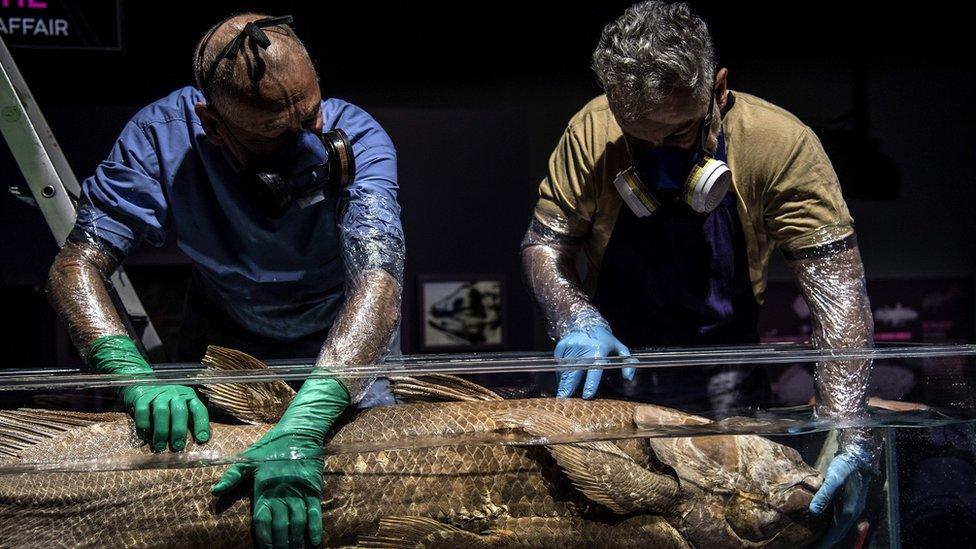The real life ancient secrets of the rare Animal Crossing fish
- Published
- comments

These are the French scientists studying a dead coelacanth in a museum
If you're an Animal Crossing fan you may have heard of the coelacanth, however, the reality behind these "living fossils", is even more mysterious.
The coelacanth was thought to be extinct until one swam by in 1938.
Since then, scientists have been studying the fish to find out more about them.
The latest study shows that coelacanths can live up to 100 years, earning them a new title of the "living fossil".
What has the study shown scientists about coelacanths?
This is what a coelacanth looks like
Scientists in France have discovered that a coelacanth can live until it's 100.
They learned about the age of the ancient fish by studying their scales, much like you can learn the age of a tree by looking at the rings on its trunk.
Coelacanths are an endangered species so any studies done on them have to be done on museum specimens.
If you play animal crossing you can get up close and personal with one
The study also found that females are pregnant for up to five years.
They aren't like most fish - they don't lay eggs but give birth to baby fish and can have anything from 8 to 26 babies or pups at a time.
Coelacanths have been around for a very long time, nearly 200 million years.
They live in dark caves on the ocean floor and can grow up to 1.8m (6ft) and can weigh more than 90kg - that's about the weight of a giant panda.
Another study done in 2013 found that they are very slow-growing and its genes evolve slowly.
This is why they still look a little prehistoric.
If you play Animal Crossing and want to have a go at catching this living fossil, you need to go fishing in the sea when its raining.
If you have bait on your fishing line it may be a little more tempting to the coelacanths.
The best place to fish from is the pier,
Good luck!
How will these studies help Coelacanths?
The more scientists and conservationists know about a creature the more they can do to protect it.
Coelacanths are endangered, there are thought to be fewer than 1000 left.
One of the researchers, K茅lig Mah茅 said:
"Our results suggest that it may be even more threatened than expected due to its peculiar life history. Consequently, these new pieces of information on coelacanths' biology and life history are essential to the conservation and management of this species."
Future studies hope to find a link between changing temperatures in the sea and the slow growth of coelacanths.
In hopes that they can find a way to save them and keep them going another few hundred million years!
- Published16 June 2021
- Published29 May 2019
